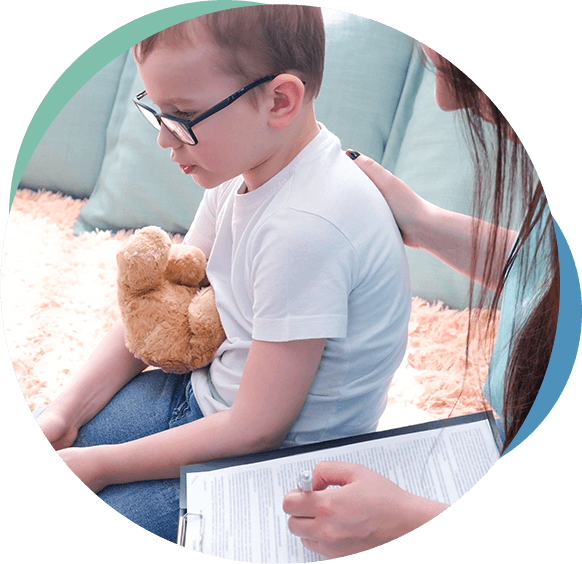Child Therapy Services
Childhood is a critical period for emotional and psychological development. Research indicates that approximately 1 in 6 children between the ages of 6 and 17 in the U.S. experience a mental health disorder each year, with anxiety, ADHD, and depression being among the most common. Early identification and intervention are crucial, as untreated mental health issues can interfere with a child’s ability to learn, form relationships, and develop a positive self-concept.
Children, especially younger ones, may not always have the language or emotional awareness to express their internal struggles. Instead, they may show signs of distress through changes in behavior, such as aggression, withdrawal, or difficulties in school. It is essential to recognize these signs and provide support before problems escalate. Mental health concerns can be triggered by a range of factors, including genetics, family dynamics, trauma, or environmental stressors like bullying or academic pressures.
At Navesink Wellness Center, we understand the complexities of child development and the importance of early mental health care. Our child therapy services are built on evidence-based practices, tailored to address the unique emotional and behavioral needs of children. We create a nurturing environment where children can feel safe to explore their feelings, learn coping skills, and build resilience for future challenges.
Common Challenges Faced by Children
Separation Anxiety
Many young children experience anxiety related to separation from parents or caregivers. This anxiety can manifest in school refusal, clinginess, or physical complaints like headaches and stomachaches.School-Related Stress
Academic pressures, bullying, or difficulty with peers can contribute to stress in a child’s life. Children may feel overwhelmed by expectations or struggle with learning difficulties that affect their self-esteem and performance in school.Behavioral Concerns
Children may act out through tantrums, defiance, or aggression, especially when they are unable to express their emotions in healthy ways. Behavioral issues often stem from underlying stress, anxiety, or changes in the family environment.Family Changes
Events such as divorce, a new sibling, or a move to a new home can significantly impact a child’s sense of security. Children may have trouble adjusting to these changes and might express their distress through mood swings, withdrawal, or acting out.Trauma and Grief
Children who have experienced trauma, such as the loss of a loved one, witnessing domestic violence, or other distressing events, may exhibit symptoms of post-traumatic stress. These symptoms can include nightmares, avoidance behaviors, or heightened anxiety.Attention and Impulse Control
Conditions like Attention Deficit Hyperactivity Disorder (ADHD) can interfere with a child’s ability to focus, follow directions, and control impulses. These challenges can affect both academic success and relationships with peers and family members.Emotional Regulation
Children may struggle to understand and manage intense emotions, leading to frequent meltdowns, mood swings, or feelings of sadness and worry. Learning emotional regulation is key to helping children develop resilience and emotional intelligence.

How Therapy Can Help
Therapy provides children with a safe and supportive space where they can express their emotions, work through their challenges, and develop healthy coping mechanisms. At Navesink Wellness Center, our therapists specialize in child-focused interventions designed to meet the developmental needs of young children. Through play, art, and talk therapy, we help children build emotional intelligence and resilience. Here’s how therapy can help:
Play Therapy and Creative Expression
Children often communicate their feelings through play. Our therapists use play therapy techniques to help children explore their emotions and experiences in a way that feels natural and safe. Creative arts therapies, including drawing and storytelling, also encourage self-expression.Coping Skills and Emotional Regulation
Children learn age-appropriate coping strategies to manage difficult emotions like anxiety, anger, and sadness. Therapy helps them understand their feelings and develop healthier responses to stressors.Social Skills Development
For children struggling with peer relationships, therapy can help improve social skills such as communication, cooperation, and conflict resolution. This fosters better friendships and reduces feelings of isolation.Strengthening Family Relationships
Family therapy is often integrated into child therapy services to help improve communication between family members and address any underlying issues within the family dynamic. Parents also receive guidance on how to support their child’s emotional and behavioral needs.Behavioral Support
For children exhibiting challenging behaviors, therapy can help identify the root causes and provide interventions to promote positive behavior. Parents are often included in the process to ensure consistent support at home.



